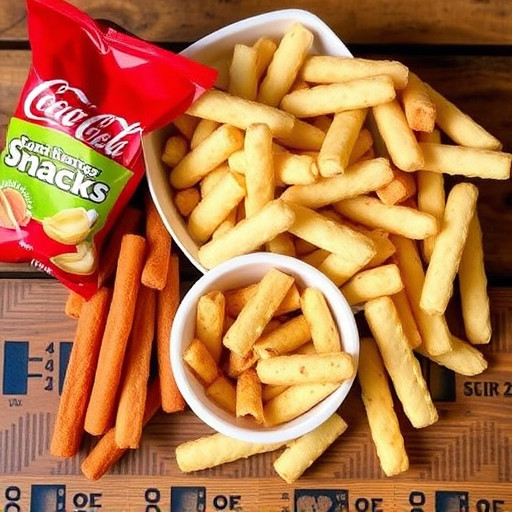Snacking impacts blood sugar levels: high-carb foods cause spikes and potential insulin resistance. Balanced snacks with fiber, protein, and healthy fats stabilize blood sugar. Snacks can aid weight management or contribute to gain, depending on portion sizes and types. Healthy snack choices like fruits, vegetables, whole grains, and nuts provide essential nutrients, while processed snacks can lead to energy crashes. Strategic snacking times maintain energy levels and digestion. Regular, mindful snacking supports better health, concentration, and physical performance; frequent unhealthy snacks increase risk of weight gain and chronic diseases.
Snacking is a ubiquitous part of our daily lives, but its impact on health can vary widely. This article explores how snacks influence our blood sugar levels, their role in weight management, and the importance of choosing nutritious options. We delve into optimal snacking times and the long-term effects of snack habits on overall health, providing insights to help you make smarter dietary choices. By understanding these factors, you can enhance your well-being through mindful snacking.
- The Impact of Snacking on Blood Sugar Levels
- Snacks and Weight Management: Friend or Foe?
- Nutritional Value Matters: Choosing Healthy Snacks
- Timing Matters: When to Eat Snacks for Optimal Benefits
- Snack Habits and Overall Health: Long-Term Effects
The Impact of Snacking on Blood Sugar Levels

Snacking can significantly impact our blood sugar levels. When we consume foods high in carbohydrates, especially simple sugars, our bodies break these down into glucose, which enters the bloodstream. This rapid rise in blood sugar prompts the pancreas to release insulin, a hormone that facilitates the uptake of glucose by cells for energy or storage.
Frequent snacking, particularly on high-carb, low-fiber foods, can lead to more frequent and pronounced spikes in blood sugar levels over time. This can contribute to insulin resistance, a precursor to type 2 diabetes. On the other hand, incorporating balanced snacks—rich in fiber, protein, and healthy fats—can help stabilize blood sugar levels between meals, promoting better metabolic health.
Snacks and Weight Management: Friend or Foe?

Snacks play a significant role in weight management, often viewed as either allies or adversaries. On one hand, they can aid in maintaining energy levels throughout the day, preventing overeating at mealtimes. Choosing nutritious snacks like fruits, nuts, or yogurt can contribute to a balanced diet and support overall health.
However, the impact of snacks on our waistlines is complex. High-calorie, low-nutrient treats can lead to excessive calorie intake and weight gain if consumed in excess. Portion sizes and frequency also matter; mindless snacking or reaching for unhealthy options can sabotage efforts to manage weight. Balancing snack choices with regular physical activity remains key to maintaining a healthy lifestyle.
Nutritional Value Matters: Choosing Healthy Snacks

When choosing snacks, focusing on their nutritional value is paramount. Opting for healthy alternatives not only satisfies cravings but also contributes to overall well-being. Fruits, vegetables, whole grain crackers, and nuts are excellent choices rich in essential vitamins, minerals, and fiber.
Conversely, processed snacks often high in sugar, salt, and unhealthy fats can lead to energy crashes and potential health issues over time. By selecting nutritious options, individuals can maintain balanced diets, support their immune systems, and promote sustained energy levels throughout the day.
Timing Matters: When to Eat Snacks for Optimal Benefits

The timing of your snack consumption plays a crucial role in how it influences your health. Eating snacks at the right times can provide much-needed energy and support overall well-being. For instance, a mid-morning snack can help maintain focus and productivity until lunch, while an afternoon snack may curb excessive hunger and overeating during dinner.
Optimal snacking also involves synchronizing your meals with your body’s natural rhythms. Consuming snacks a few hours before or after a main meal can aid digestion and prevent blood sugar spikes. Experimenting with different snack times can help you discover what works best for your body, ultimately promoting healthier eating habits.
Snack Habits and Overall Health: Long-Term Effects

Snack habits can have a significant impact on our overall health in the long term. Regular snacking, when done right, can contribute to stable blood sugar levels and energy throughout the day, aiding in concentration and physical performance. However, frequent consumption of unhealthy snacks high in sugar, saturated fats, and processed ingredients can lead to weight gain, increased risk of chronic diseases like diabetes and heart disease, and potential dental issues.
Developing mindful snacking habits involves choosing nutritious options like fruits, nuts, yogurt, and whole-grain crackers. These foods provide essential nutrients, fiber, and protein that promote satiety and support overall well-being. Over time, adopting these practices can contribute to better management of appetite, improved digestion, and a reduced risk of developing health complications associated with poor dietary choices.
Snacking can significantly impact our health, affecting blood sugar levels, weight management, and overall well-being. Choosing nutritious snacks and timing meals appropriately are key to reaping the benefits. By selecting healthy options and incorporating them into a balanced diet, individuals can improve their energy levels, maintain a stable mood, and support long-term health goals.

